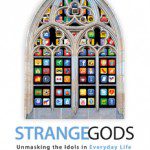Lectionary Reflections on Trinity Sunday – May 26, 2013
Proverbs 8:1-4, 22-31; Psalm 8; Romans 5:1-5; John 16:12-15
Today’s readings speak of a lively, energizing, relational vision of the Trinity, a far cry from the disembodied, abstract, and irrelevant descriptions found in many theological tomes. The Trinity, along with the Incarnation and the divine presence in history, is one of the great antidotes to the tendency of some Christians to see God as apathetic, a-historical, and unchanging in contrast to the passionate, evolving, and transitory world of time and space. These Christians identify divine perfection with eternity and changelessness rather than the rough and tumble world of history and interdependence. Such images of the Trinitarian God have led many to see the doctrine of the Trinity as a useless appendage to Christian theology of no importance to the needs and challenges of the world of personal and political decision-making.
In contrast, I believe that the Trinitarian God is constantly dancing, growing, choosing, and changing. This lively God has not decided everything in advance without consulting the creaturely world, nor has the living God imaged the whole unfolding of history in one eternal, unchanging vision. The Trinitarian God suggested by today’s passages embodies loving fidelity through intimate and changing relationships with the unfolding world and its inhabitants. In contrast to Aristotle’s unmoved mover, thought thinking simply about itself since any other object would imply a fall from perfection, the lively Trinitarian God is, to quote philosopher Charles Hartshorne, the “most moved mover,” the one to whom all hearts are open, all desires known, and all futures open to creative process.
Proverbs 8 describes divine creative wisdom (Sophia, hokmah) as the creative, artistic, and playful aspect of divinity. God likes a good time; God’s creativity is play not work. It is the flow of what Willis Harmon once described as the “higher creativity.” The universe was created for joy. Similar to the lila of Hindu cosmology, Sophia-hokmah-wisdom creates out of abundance and delight. She has as her vision, to paraphrase the philosopher Alfred North Whitehead, the aim to create beauty in the unfolding universe. God delights in beauty, God has fun in creativity, the poet of the universe rejoices in the creativity of creaturely life.
Proverbs 8 counsels a spirituality and ethic of joyful attentiveness. If God has a bias toward joy and playfulness, then these are values we should also pursue in our personal and corporate activities. Spirituality is about fiery passionate love of the earth, not otherworldly withdrawal. Ethics aims toward beauty and play, that is, creating the circumstances in which all persons – and let us include creation as a whole – might live playfully, joyfully, and creatively. An ethic of playfulness and joy seeks justice as the foundation for creative living and loving, for children truly enjoying childhoods, and woodlands and seas teeming with life.
Psalm 8 joins the macrocosm and microcosm in a sacred unity. The Psalmist would delight in photographs from the Hubble telescope. The Psalmist’s vision is truly cosmic, giving flight to any notion of a young earth or earth-centered cosmology. The universe is vast and we are but a drop of existence in a multi-galactic evolutionary process. All we can do is be amazed at the billions of galaxies, spiraling nebula, and our own small, but beautiful, solar system. Amazement doesn’t end here: the Psalmist would be equally at home with electron telescopes, C-T scans and MRI’s. The Psalmist would be amazed but not surprised at the universes within our bodies, reflected in the workings of our nervous, immune, digestive, and reproductive systems. We are as Psalm 139 proclaims awesomely and wonderfully made, incarnating the wisdom that created the universe in our microcosmic lives.
For Psalmist cosmology leads to axiology; in other words, our vision of the universe is manifest in a value system that delights in complexity of flora and fauna, humbly living out our vocation, and recognizing our obligations to God and our fellow creatures. Psalm 8 sees us rooted in the cosmos, children of the universe along with sea monsters, osprey, fireflies, and redwoods. Our “dominion” is not ownership but care and stewardship. We do not own the land, seas, woodlands, or air; we are gardeners of creation, charged with using our vocation to nurture beauty. Death is built into the structure of Earth-life, but our own destruction of animals and woodlands, and our use of soil and sea, is governed by God’s greater vision of Earth-care. God’s eye is on the sparrow, and we better notice the sparrow as well!
The words of Romans 5 describe a cascade of divine grace, an ever-flowing stream, filling us with all good things. We live in God’s lively grace through the inner movements of God’s Spirit. The creative wisdom of the cosmos is alive in our own creaturely existence. God’s wisdom guides and sustains us, luring us toward God’s vision of Shalom and wholeness. The Romans passage is fully aware of life’s trials, but God’s graceful Spirit enables us to experience wholeness despite the “many dangers, trials, and snares” we must confront in a course of a lifetime. The Spirit, whispering in sighs too deep for words, sustains us when we have reached the end of our powers and must trust a power greater and more loving than ourselves, knowing that whether we live or die, we belong to God.
God’s Spirit is alive in us, so proclaims Jesus to his disciples then and now. Christ’s wisdom is ours. God wants to give us everything necessary for faithful and powerful living. We can embody the mind of Christ, seeing as Christ did and living as Christ lived. God wants us to think big and act big as God’s emissaries today. We are the embodiments of divine creative wisdom; we are Sophia’s spokespersons, crying on street corners today. Spirit-centered living invites us to see ourselves as God’s companions in saving the world. This inspires us to seek an ethic of stature, encouraging largeness of spirit and experience, and radical hospitality, in ourselves and others.
The Trinitarian God is alive and well, dancing, playing, beautifying, and calling us to dance, play, and be beautiful ourselves, incarnating God’s alternative vision in our lives and communities.

















